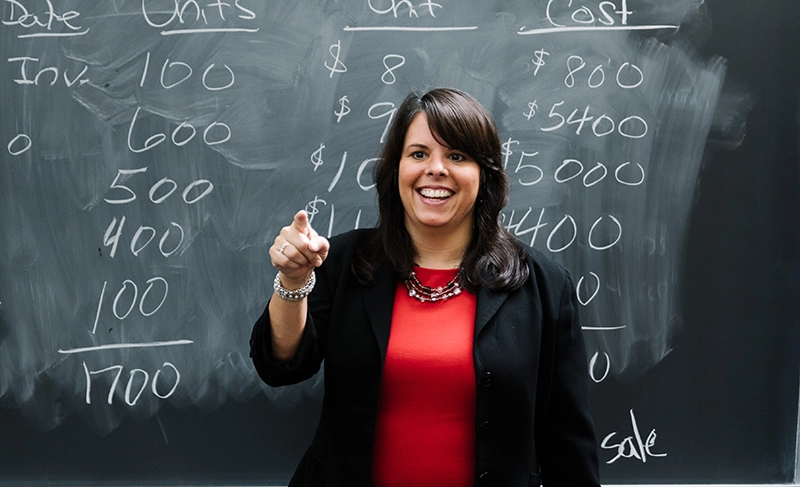Christine Earley, Ph.D. leads the college’s response to the AI challenge
By Michael Hagan ’15, ’19G
Christine Earley, Ph.D., professor of accountancy and interim dean of the School of Business, leads the college’s initiatives to ensure that students are technically equipped — and intellectually, ethically, and creatively prepared — to enter the workforce amid the AI revolution.
“AI-enabled tools could become one of the biggest disruptors to education we have seen in decades,” said Earley, chair of the college’s Artificial Intelligence Committee, which was established in 2023 and includes 22 faculty members and staff representing 20 departments and offices.
Earley has presented on the college’s AI efforts to the Board of Trustees and the National Alumni Association, compiled resources for faculty members, and assisted Rev. Mark Nowel, O.P., Ph.D., associate provost for academic policy and mission support, with updates to the college’s academic integrity policy.
At its core, generative artificial intelligence draws upon vast textual data and predictive pattern matching to create responses to user-generated prompts. It can produce essays, works of art, presentations, computer code, and other course assignments. Recent advancements have enabled AI tools to reason through more complex mathematical problems as well.

As an accountant, Earley is no stranger to changes in technology. As an educator with a master’s degree in cognitive psychology, she understands the importance of cognitive processes, like synthesis and evaluation, that are involved in study habits as simple as notetaking. AI-enabled tools that produce notes, outlines, and quizzes based on written sources or classroom recordings sidestep these higher-order thinking skills, decreasing retention and inhibiting intellectual growth.
Faculty reactions to emerging AI tools are mixed. While some professors integrate AI into assignments, others are returning to traditional “blue book” exams to preempt plagiarism.
“It is not possible to create a single AI policy for all courses at the college,” Earley said. “The policy is that faculty should have a policy, and it should be in their syllabi.”
The college emphasizes that professors must be clear about the rules and rationale so that students understand what tools they may use and “how these tools might inhibit or enhance the learning process.”
The guidance emphasizes integrity. Faculty are encouraged to define consequences for infractions, such as use of illicit tools, or failure to disclose which parts of an assignment were AI-generated when AI use is permitted.
The AI Committee, Information Technology Department, and Finance and Business Division are investing in tools to protect privacy and intellectual property made vulnerable by new technologies. Earley looks forward to partnering with faculty from all disciplines to discuss “the big-picture questions” these technologies raise.





